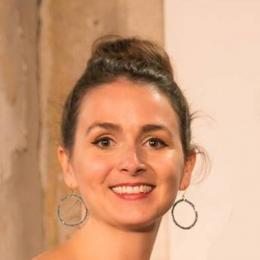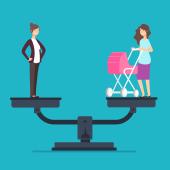With drivers racing on long stretches of asphalt in cramped in cars made for one, NASCAR seems like a solitary sport. But a driver is nothing without their crew. These teammates work in unison to adjust tires, refuel, and ensure their driver crosses the finish line first.
NASCAR instills a “team first” culture on and off the tracks. Its legal team is equally thrilled to be working at NASCAR as they are with their team members — and it shows.
During an interview with ACC, the NASCAR legal team, which includes six female lawyers (a surprise from a sport with 60 percent male fans) and is led by General Counsel Tracey Lesetar-Smith, praised each other for their hard work while volleying questions to those who could best answer them.
Individually and collectively, the legal team’s members have a wealth of information and the skills needed to work together seamlessly. This was especially true during COVID lockdown when they collaborated to reopen the tracks for happy fans and colleagues alike.
Below is an excerpt of ACC’s interview with these six in-house lawyers.
This interview has been edited for clarity and length.
Meet the Legal Dream Team
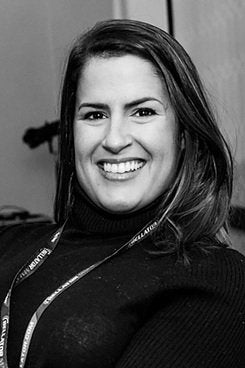
Tracey Lesetar-Smith, General Counsel and Senior Vice President of NASCAR
Tracey oversees the legal and government affairs operations for NASCAR, from its national competition series to their international races in Canada, Mexico, and Europe. Her team handles licensing, broadcast, digital media, racing competition, litigation, and more, while her Government and Community Affairs team fosters critical relationships with local, state, and federal public officials throughout the United States.
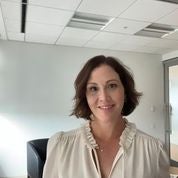
Katie Hoffman, Associate General Counsel
Katie is supporting the restructure of NASCAR’s advertising deals, and she led the drafting and negotiation of the Coca-Cola and Anheuser Busch Premier Partnership model. During COVID-19, she has worked with partners to bring alternative events to NASCAR facilities.
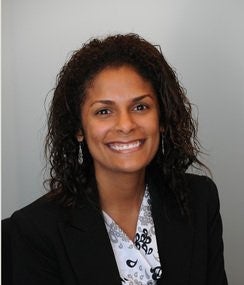
Amanda Oliver, Assistant General Counsel, Media and Broadcast Data
Amanda has been with NASCAR since 2005, first as a summer intern and now as AGC. She is presently managing media and sponsorship projects, while working on the NASCAR’s potential gambling initiatives.
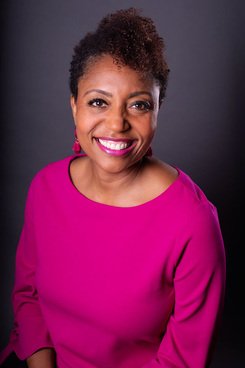
Nichelle Levy, Esq., CIPP/US, CIPP/E, CIPM, PLS | Senior Counsel, Digital and Privacy Data, Legal
Nichelle has been with NASCAR since 2012, when it was taking back their digital rights from Turner Sports. She has since established contract management and compliance processes for digital media and technology services and led consumer privacy initiatives.
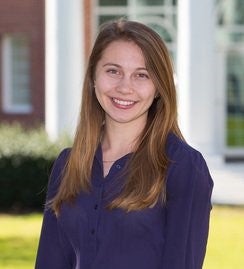
Kelsey Pincket, Corporate Counsel
Kelsey originally joined International Speedway Corporation (ISC) in 2018, which has since been acquired by NASCAR. She now works with the new unified team, focusing on the real estate and track space.

Jourdan Williams, Assistant Media Counsel, NASCAR
Jourdan advises NASCAR on legal aspects of marketing and entertainment services, such as product license renewal agreements. She also supports the production team on footage licensing, rights clearances, and other agreements.
The team that works together, wins together
ACC: Tracey, what is the key to leading an effective team? To add to that, how have you had to adapt your leadership style during COVID-19 times?
Tracey: Sure, I think that the foundation of leading during the fray is trust and communication. And understand how difficult it was for me to ask a group of people who just met me less than five months prior to place their trust in my leadership during a crisis. That's a tall order during a maelstrom of really sobering challenges.
The pace was furious in 2020 — organizing and conveying the information that was coming and going. It was it was like trying to herd a swarm of bees. And let's say what we want to say, right? Let's say what the what the real elephant in the room is, and that is that we were all scared. It was a time that really had this edge of darkness on it.
And look, we're still we're still going through it in a lot of ways. We're still we're trudging through it, right? “If you're going through hell, keep on going.” That's what Churchill said. So, this really wasn't, in my mind, a test of any one person. But it was a test of whether we would play as individuals, and take care of each our own worlds, or if we play as a team where we're going to win championships. We played as a team and we won championships. That's the way that I look back at this.
We played as a team and we won championships.
Tracey Lesetar-Smith
For me, I just leaned on what I view humbly as my own meager strengths, which are having direct conversations with my team leads and with individuals on the team. Sharing what I could when I could. Giving the best guidance that I could offer, given what I knew, and above all else I tried very hard and continue to try to lead with empathy, knowing that this team is staggeringly competent. It's a caring, agile village of people. They learned how to work effectively from home in a week. One week the entire team figured out how to work from home. So, I think that it was a real challenge coming in and not knowing people as well. But I was grateful that I was again at least able to rely upon the things that I know as a woman are my own strengths and as a leader and a manager, and really show that the team could trust, communicate, and rely upon each other. That that's how we got through.
Working together is critical, especially in dire times like a pandemic. After being shutdown for a few months per COVID orders, NASCAR began racing again in May 2020 without fans, then you brought fans back to the track in June. How did the legal team ensure the safety of the event with and without fans?
Tracey: I'd like to punt this to Nichelle and Kelsey, if you don't mind.
Nichelle: Kelsey, can you start talking about the return to racing, and I'll follow up with the return to office?
Kelsey: Sure, absolutely! So, the return to racing, I think, was so exciting for this team because it became very apparent early on that we were going to be able to be one of the first sports back just based on how our sport operates. It was simple enough for the sport to figure out how to travel in this bubble and to allow fans to attend the races without actually interfering with that bubble.
It became apparent really early on that we were going to have an opportunity to do this. The way that NASCAR approached it was really kind of in a phased approach. First, we started racing without fans. How are we going to be able to run these races without having fans, having limited capacity, having limited support in the different areas that we raced?
So, we started out in Darlington, SC, where we had great support locally. From there, we moved on to Homestead Racing in Florida, where we opened it to very, very limited fans, where it was just people that we invited — and it was all first responders and service members who came out to that event.
Read more about NASCAR's legal dream team in "The Women-led Legal Team Steering NASCAR Toward Success."
I think the theme of return to racing has been that everyone's been so thankful, which has been so exciting for us to work on, and just being able to see how exciting it is for everyone to come to the races and feel comfortable there.
You may have seen some of the different things that we've implemented, but obviously, we've had face masks implemented for everybody who attends the races, and there's been temperature checks at the races. There’s a very, very smart team that's worked on ensuring social distancing and calculating how many people you can allow into the races and where they need to sit so that they don't walk past other people, so that nobody is kind of in anyone else's space.
There is a mathematic equation that went into how many fans we could welcome to our facilities. It was all way above my head, but there were so many people involved in figuring out how we could do it safely. From there, we kept increasing safety precautions, so we were comfortable going beyond the 500 people we had at Homestead.
You can take in a live sporting event and feel really comfortable doing it.
Kelsey Pincket
Then we were able to up it for Talladega, then bring it to Daytona, where again, we were comfortable so we could raise attendance again. And it's gone really well. If you have the opportunity to attend one of our races during this time, I think it's a place where you can come and actually take in a live sporting event and feel really comfortable doing it. It's been it's been great for us. And Nichelle has actually helped us get back into the office too, which has been wonderful.
Nichelle: Thank you, Kelsey. It certainly helped that so much work had been done on the return to racing. There was a 120-page document of protocols that have been put together with respect to the return to racing. So, when they started to form the work teams to think about how to return to the office, we really did have the benefit of looking at some of that work that they had consulted with an epidemiologist and several others to help to develop that.
So, there were three different work streams. There was a core group on the communications side, the legal side, the HR side, and the facility side that kind of hovered above each of those work streams and had input to all of them.
My role was thinking about local, state, or federal regulations, thinking about the buildings that we lease, landlord restrictions, or in some ways our wanting to influence the landlord to impose additional restrictions that they might not have been considering. With the goal of trying to create an atmosphere in our offices that would make our employees feel safe, would make them feel comforted that we really had their best interests at heart, and that we were taking every step possible to create a safe environment for them.
Read about the changes NASCAR is making for diversity and inclusion in “The Fast Lane to Progress.”
So really, working with the facilities group, for example, to adjust to the recommended COVID-19 environment levels of sanitation and cleaning that we needed.
This included ensuring we had appropriate signage. When you come into our offices, you see so much signage, like “two people in an elevator,” and “half capacity in conference rooms.” Chairs were literally removed and taken off premises so they could not be restored to conference rooms so people could not violate those rules. So really thinking tactically about that, but also our team was thinking about little things like when people do return, let's have a gift pack for them that has a couple of masks, some personal-sized hand sanitizers, things to make people feel welcome.
I was pleased to be a part of that. We had the opportunity to work with very good outside counsel, as well that was counseling other companies. This gave us the benefit, of general guidance about this brand new area. It did help with my data privacy background, thinking about some of the collection of information that's brand new (I.e., temperature scans, etc.) and that isn’t information we previously collected. We were working with our vendors to make sure that information was handled appropriately.
There’s a need for creativity in order to adapt in the pandemic. And one thing that stood out when reading your profiles is that NASCAR is working with different partners to bring alternative and safe events to NASCAR facilities, like driving concerts. Can you describe some of these examples and partnerships?
Katie: So, I'll tag on to that and the creativity piece. I've worked at a couple of different organizations, but I will say, hands down, the people who we work with here are the most creative people. They are thinking so hard every day about how we can adjust. It's a real credit to the legal team that was here before me and built all these relationships. They should feel so comfortable with legal, and they loop us in very early in the process.
Entertainment's a big part of any live sporting event. We always have a band that plays before the races, like the Daytona 500 and some of our bigger events. One of the things that we're working on [with our track teams] is how can we have a band? How can we entertain our people who are on property, camping, who are there for really long days when the race is relatively short? I mean, the race is two-and-a-half hours and the gates open like five hours ahead of time, so you're there for a long time.
The people who we work with here are the most creative people.
KATIE HOFFMAN
So how can we entertain these people and how can we do it safely? They'll come to me and say, “OK, here's our idea, here's what we want to do.” So, we worked together to drill it down to what Kelsey and her team are comfortable with on the racetrack property side.
What does the partner want to do? And do those two things align? If they don't align, how can we get them to align? And again, I know this has been a common theme, but it really is part of the organization. It's really just a testament to working together as a team and having all of these groups understand that we each have an important role to play.
They need to bring in revenue and entertainment for our fans, and we need to help them do it in a way that makes sure that the organization is protected in every way we can legally. So, it's been a really fun year from that aspect of trying to get creative and how we can get people to stay engaged with the sport and continue to be engaged with the sport well beyond COVID.

